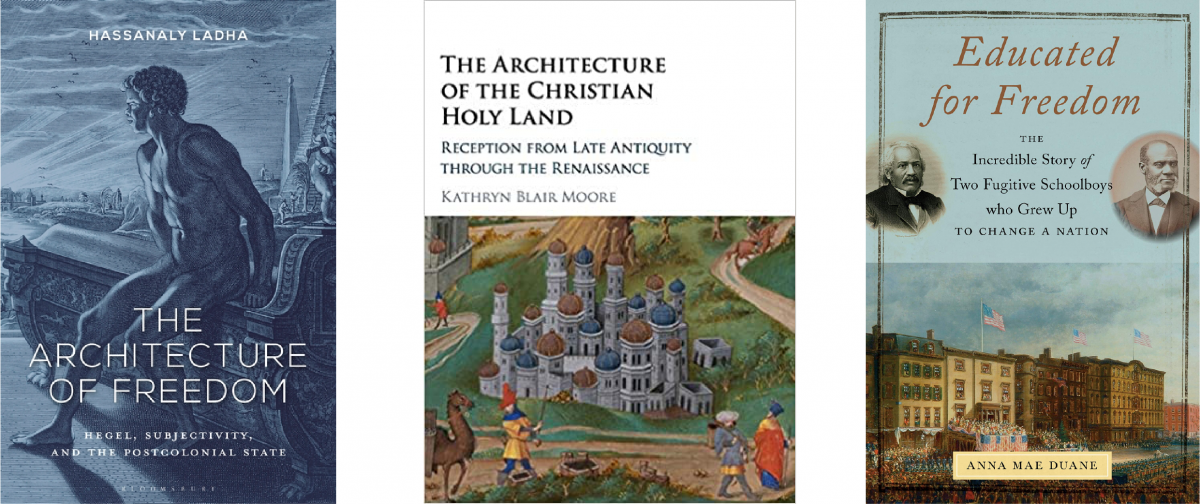The University of Connecticut Humanities Institute (UCHI) is proud to announce the winner and the two finalists of this year’s Sharon Harris Book Award. The Sharon Harris Annual Book Award is given for a monograph published by UConn Tenure, Tenure-Track, Emeritus, or In-Residence faculty that best demonstrates scholarly depth and intellectual acuity and highlights the importance of humanities scholarship.
This year’s winner is Kathryn Blair Moore, an Assistant Professor of Art History, for her book The Architecture of the Christian Holy Land: Reception from Late Antiquity through the Renaissance (Cambridge University Press, 2017).
The finalists are Hassanaly Ladha, Assistant Professor of French and Francophone Studies, for The Architecture of Freedom: Hegel, Subjectivity, and the Postcolonial State (Bloomsbury, 2020); and Anna Mae Duane, Associate Professor of English, for Educated for Freedom: The Incredible Story of Two Fugitive Schoolboys Who Grew Up to Change a Nation (NYU Press, 2020).

Winner
 Kathryn Blair Moore, The Architecture of the Christian Holy Land: Reception from Late Antiquity through the Renaissance (Cambridge University Press, 2017)
Kathryn Blair Moore, The Architecture of the Christian Holy Land: Reception from Late Antiquity through the Renaissance (Cambridge University Press, 2017)
Professor Kathryn Moore’s book is a wonder of scope, methodology, and scholarly creativity that examines buildings enclosing spaces associated with the bodily presence of important religious figures as foci for real and imagined pilgrimages. Moore employs the destruction and re-creation of architecture as a lens for viewing interchanges of cultures and religions, providing a compelling historical account that challenges current dominant narratives of age-old, intractable faith-based conflicts. Noteworthy for drawing upon both visual and material culture as well as textual sources from four continents, this monumental work advances the fields of history of art, architecture, and religion, and contributes broadly to the humanities by demonstrating the mediated nature of the experience of the architecture of the Holy Land.
Finalists
 Hassanaly Ladha, The Architecture of Freedom: Hegel, Subjectivity, and the Postcolonial State (Bloomsbury, 2020)
Hassanaly Ladha, The Architecture of Freedom: Hegel, Subjectivity, and the Postcolonial State (Bloomsbury, 2020)
Professor Hassanaly Ladha’s groundbreaking work brings new and important insights to Hegelian philosophy. It sheds light on misunderstood areas in Hegel’s works, particularly relating to his view and presentation of Africa within the prism of his ideas on the master-slave dialectic and the political state; it is the first work to clarify the place occupied by Africa in Hegel’s understanding of the aesthetic origin of freedom, and underlines Hegel’s relevance as a modern philosopher in modern discussions on slavery and post-colonialism. Professor Ladha’s work is a remarkable reassessment of both Hegel’s major works and also neglected and misunderstood writings.
 Anna Mae Duane, Educated for Freedom: The Incredible Story of Two Fugitive Schoolboys Who Grew Up to Change a Nation (NYU Press, 2020)
Anna Mae Duane, Educated for Freedom: The Incredible Story of Two Fugitive Schoolboys Who Grew Up to Change a Nation (NYU Press, 2020)
Professor Duane’s exquisite book tells the entwined stories of James McCune Smith and Henry Highland Garnet, two classmates at the Mulberry Street New York African Free School in the 1820s, as they become renowned public figures and leaders in the struggle for black freedom. With an innovative narrative approach and creative archival work, Duane draws from their individual journey’s fresh insights to big historical questions and concerns, shedding new light on American racial formation, childhood, and the very meanings of freedom, belonging, and realized human potential. Duane’s eminently readable work demonstrates the expansive capacities of the humanities with beautiful craft and style.

